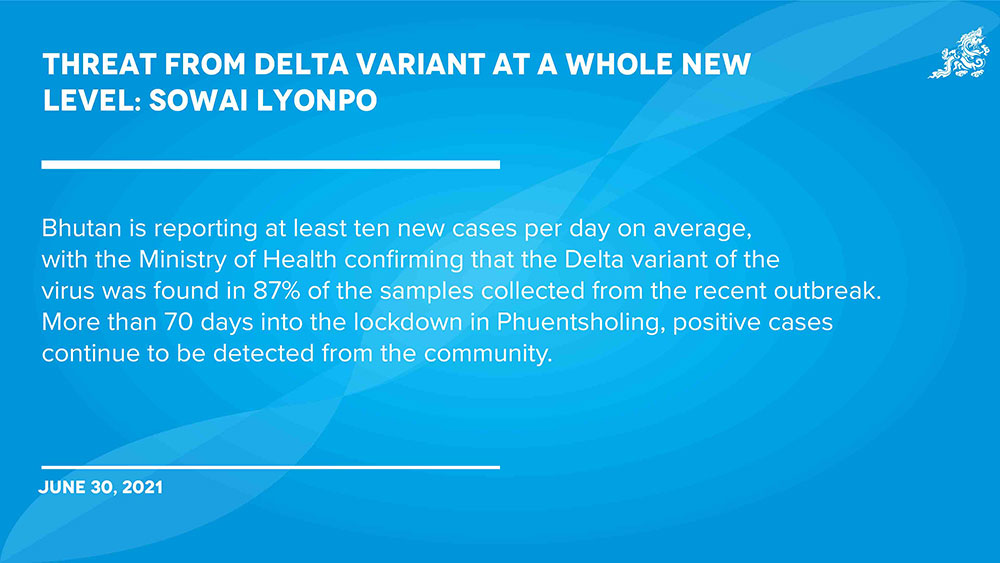Younten Tshedup
Dubbed as the ‘fastest and fittest’ coronavirus strain by the World Health Organisation (WHO), the Delta variant of the SARS-CoV-2 virus is spreading fast in the country.
Bhutan is recording at least 10 new cases every day, on an average, in the ongoing outbreak which started on April 16. Experts had been cautioning the public that the outbreak this time could be due to the Delta variant, which first emerged in India earlier this year.
The health ministry on June 19 confirmed that 87 percent of the samples collected from the recent outbreak were due to the Delta variant of the virus.
What does this mean?
Health experts said that although most of the people testing positive in the current outbreak were asymptomatic or showed mild symptoms, there was the possibility of some developing severe complications (disease) if this continued.
A doctor with the national referral hospital said that it was like a lottery game. “You don’t always win a lottery. But then sometimes you get lucky and hit the jackpot. It is the same case with Covid,” he said. “Not all who get the virus become severely ill. But you can never say you’ll not develop severe disease from the virus.”
He explained that when people in large groups bought lottery tickets, the probability of the group winning increased. “Similarly, when more people contract the disease, the probability of people developing a serious disease is high, including death.”
Sowai Lyonpo (health minister) Dechen Wangmo said that people should be ‘extremely cautious’ knowing that the Delta variant of the virus was highly transmissible.
Lyonpo said that the threat now was at a whole new level. “In the past, if people thought that they did not contract the virus even if they were in contact with some positive individuals, this time, they will definitely get infected.”
Is the new variant making lockdowns ineffective?
More than 70 days after locking down Phuentsholing, the bordering town is still detecting positive cases from the community.
Lyonpo said that although the Delta variant was behind the fast and multiple transmission in the bordering areas, non-compliance to the lockdown protocols was one of the major reasons behind the surge in positive cases.
“Lockdown alone doesn’t protect you from the virus if you do not follow lockdown protocols strictly,” she said. “Even with the lockdown, if individual behaviour does not change, we will continue to have the disease.”
Lyonpo said that people in the south have gone through so much, but the carelessness of a few individuals compromises the entire lockdown and puts the whole community at risk. “It takes only a few people to breach the protocol and put the entire community at risk,” she said.
For example, she explained that in a building if all the people followed the protocol, the transmission ends in that building. “However, if there is one individual who is not following the protocol, the entire building has to suffer. It is time people learn that a single mistake of yours not only affects you but the entire community and nation at large.”
Lyonpo called for support from the community in helping prevent further outbreaks. “If you see anyone not following the protocols or moving out during a lockdown, people should immediately report such incidents. We need this support from our people.”
Some good news
Following the April outbreak in Phuentsholing, 1,370 local transmission cases have been reported in the country. Of the total, 1,113 cases were detected from the primary contacts of the infected. Only 257 people tested positive from the community.
Lyonpo Dechen Wangmo said that this was a ‘very good’ indication that the surveillance system was working. “About 81 percent of our positive cases are turning positive from the quarantine centres and we are picking the cases at an early stage.”
She added that if the 81 percent were from the community, it would have been a disaster for the country.
However, the minister added that the outbreaks were becoming bigger and wider. During the first local outbreak in Phuentsholing last year, 144 people tested positive for Covid-19. The numbers this time have already crossed 350.
“If we continue to have big outbreaks, it would be very difficult for us. We are worried about the vulnerable population and especially, children. Our behaviour must not endanger the lives of our children.”
In anticipation of a worst-case scenario, the health ministry, upon the command of His Majesty The King has readied a 120-plus-bed Covid-19 hospital in Phuentsholing. “We expect to increase the capacity to 200-beds by the first week of July. Additional manpower including De-suup Plus would also be deployed there,” Lyonpo said.
Edited by Tshering Palden


